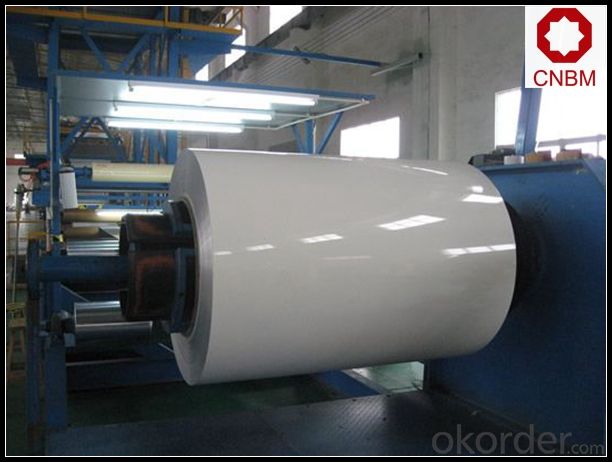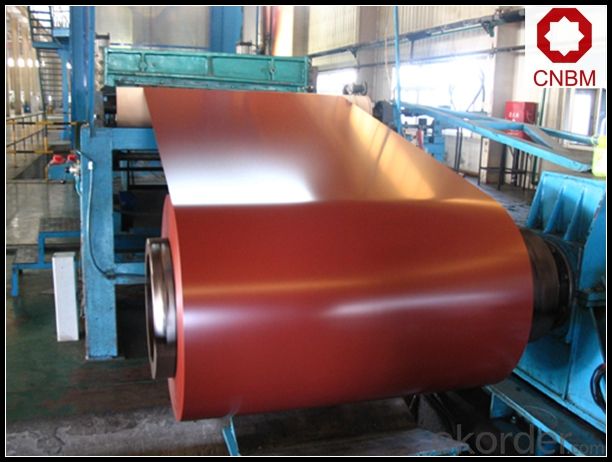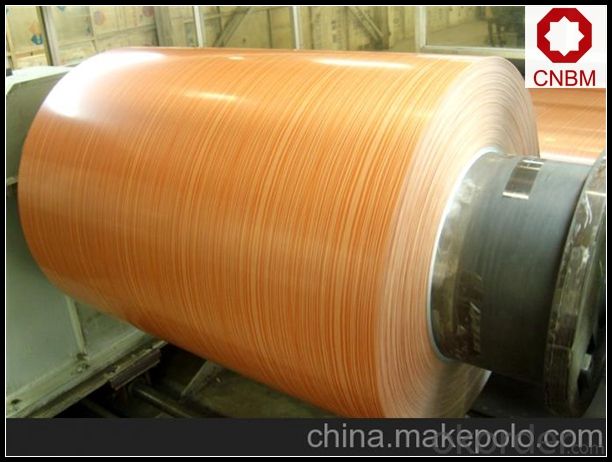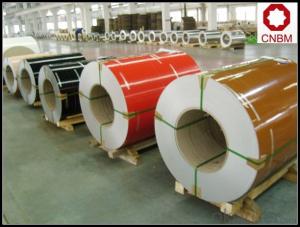Color Coated Aluminum Coil for Aluminum composite panel
- Loading Port:
- Shanghai
- Payment Terms:
- TT OR LC
- Min Order Qty:
- 5 m.t.
- Supply Capability:
- 10000 m.t./month
OKorder Service Pledge
OKorder Financial Service
You Might Also Like
Item specifice
1. Specification of Color Coated Aluminum Coil
1) Alloy | 1050, 1060,1100, 3003 3004 3105 3A21 5005 5052 etc |
2) Temper | O/H12/H14/H1/H18/H32/H34/H36/H38//H111/H112/H116/H321/T6/T651/T3/T351 etc |
3) Thickness | 0.1mm to 6mm |
4) Width | 20mm to 3300mm |
5) Coil weight | 100kgs to 6 tons depends on actual requirement |
6) Core material | Aluminum or paper |
7) Coil Inner diameter | 75mm, 150mm, 200mm, 300mm, 405mm, 505mm or as required |
8) Protective film can be added
2. Application of Color Coated Aluminum Coil
(1).Interior: wall cladding, ceilings, bathrooms, kitchens and balconies, shutters, doors...
(2).Exterior: wall cladding, facades, roofing, canopies, tunnels,column covers , renovations...
(3).Advertisement: display platforms, signboards, fascia, shop fronts...
3. Feature of Color Coated Aluminum Coil
*Such coil is specially designed to replace aluminum ingot, due to the high export tax of aluminum ingot, the coil has better price than ingot.
*This type of coil can fit customer's remelting furnace just like ingot, no need to make any change to the production line that was previously used for ingot. The standard coil size and weight is very suitable for the feed gate of furnace.
*This type of coil causes less material wastage than ingot when remelted.
*Our coil is made directly from ore, no need to go though the ingot making process, quality is much better than other suppliers who use ingot scrap to make coil.
Be free from Oil Stain, Dent, Inclusion, Scratches, Stain, Oxide Dicoloration, Breaks, Corrosion, Roll Marks, Dirt Streaks and other defect which will interfere with use
4. Certificate:
SGS and ROHS(if client request, paid by client), MTC(plant provided), Certificate of Origin(FORM A, FORM E, CO), Bureau Veritas and SGS (if client request, paid by client), CIQS certificate
5. Image of Color Coated Aluminum Coil



6. Package and shipping of Color Coated Aluminum Coil
eye to wall
eye to the wall
with wood pallet (wooded case also available)
7. FAQ
1) What is the delivery time?
Dpends on actual order, around 20 to 35 days
2)What is the QC system:
We have QC staff of 20 persons and advanced equipment, each production is with MTC traced from Aluminum ingot lot.
3) What market do you mainly sell to?
Australia, America, Asia, Middle East, Western Europe, Africa etc
- Q:What is the price range of aluminum coils?
- The price range of aluminum coils can vary greatly depending on factors such as the grade and thickness of the aluminum, quantity purchased, and current market conditions. Typically, aluminum coils can range from $1 to $5 per pound.
- Q:Can aluminum coils be used in the production of heat shields?
- Yes, aluminum coils can be used in the production of heat shields. Aluminum has excellent thermal conductivity, making it an effective material for transferring and dissipating heat. Additionally, it is lightweight and has good corrosion resistance, making it suitable for various applications where heat protection is required, such as in automotive or aerospace industries.
- Q:How are aluminum coils tested for flatness?
- Aluminum coils are tested for flatness using various methods to ensure they meet the required standards. One common method is through the use of a straight edge, where a long, precision straight edge is placed on the surface of the coil. Technicians then visually inspect for any gaps or deviations between the straight edge and the coil's surface. If any gaps are found, it indicates that the coil is not flat and further analysis is required. Another method used is the straight edge ruler technique, where a ruler with a thin, flexible edge is placed on the coil's surface. By applying gentle pressure, technicians can identify any areas where the ruler does not make full contact with the coil, signaling irregularities in the flatness. Advanced techniques such as laser or optical methods are also employed to assess the flatness of aluminum coils. These methods use laser beams or optical sensors to measure the surface profile of the coil. The data collected is then analyzed to determine if any deviations from the desired flatness exist. These techniques provide accurate and precise results, allowing for a more detailed evaluation of the coil's flatness. Overall, the testing of aluminum coils for flatness is crucial to ensure that the coils meet the required standards for various applications. By employing a combination of visual inspection, straight edge techniques, and advanced laser or optical methods, manufacturers can ensure that the coils are flat and free from any irregularities that could affect their performance.
- Q:Can aluminum coils be used for automotive body panels?
- Certainly, automotive body panels can be made using aluminum coils. In fact, aluminum is gaining popularity in the automotive sector due to its numerous advantages. Its lightweight nature contributes to enhanced fuel efficiency and overall vehicle performance. Furthermore, aluminum exhibits exceptional resistance to corrosion, making it a durable option for automotive body panels. Additionally, aluminum can be easily shaped and molded, enabling intricate designs and improved aerodynamics. All in all, utilizing aluminum coils for automotive body panels presents a viable choice with a multitude of benefits.
- Q:How are aluminum coils used in insulation applications?
- Aluminum coils are commonly used in insulation applications due to their excellent thermal conductivity and durability. They are typically used as a component of HVAC systems, where they are used to transfer heat between the air and the refrigerant in order to control the temperature of a space. In insulation applications, aluminum coils are often used in the production of air conditioning units, heat pumps, and refrigeration systems. These coils are designed to efficiently transfer heat, allowing for the effective cooling or heating of a space. The coils are typically made of aluminum due to its high thermal conductivity, which enables the efficient transfer of heat. Additionally, aluminum is lightweight and corrosion-resistant, making it a suitable choice for applications that require durability and longevity. Aluminum coils are commonly used in conjunction with other insulation materials such as foam or fiberglass to create a thermal barrier. This combination helps to minimize heat transfer between the inside and outside of a building, reducing energy consumption and improving overall energy efficiency. Furthermore, aluminum coils can be easily formed into various shapes and sizes, allowing for customization and flexibility in insulation applications. This versatility makes them suitable for a wide range of insulation needs, from residential to commercial and industrial settings. In summary, aluminum coils play a crucial role in insulation applications by efficiently transferring heat and contributing to energy efficiency. Their thermal conductivity, durability, and versatility make them an ideal choice for various insulation needs, helping to create comfortable and energy-efficient environments.
- Q:What role does the powdered aluminum play in this reaction?
- Aluminium okorder /
- Q:What are the bending and forming capabilities of aluminum coils?
- Due to its inherent properties as a malleable and ductile material, aluminum coils possess outstanding abilities in bending and forming. The high strength-to-weight ratio of aluminum allows for easy shaping and forming without compromising its structural integrity. In terms of bending, aluminum coils exhibit remarkable flexibility and can be bent into various shapes and angles without any risk of fracturing or cracking. This flexibility enables the formation of tight curves or gentle bends, making aluminum coils suitable for a wide range of applications. Particularly in industries such as construction, automotive, and aerospace, where curved or intricate shapes are often needed, the flexibility of aluminum coils proves to be highly advantageous. In the realm of forming, aluminum coils can be effortlessly manipulated into different forms, including flat sheets, tubes, or intricate profiles. This versatility makes aluminum coils highly sought after in industries that prioritize customization and design flexibility. Moreover, aluminum coils can undergo various forming processes, such as roll forming, stamping, and deep drawing, which allow for the transformation into different products with precise dimensions and tolerances. These exceptional forming capabilities make aluminum coils the preferred choice for manufacturing components like automotive body panels, roofing materials, heat exchangers, and structural elements. In conclusion, the exceptional bending and forming capabilities of aluminum coils make them an ideal choice for applications that demand flexibility, durability, and design versatility.
- Q:What are the advantages of using aluminum coils in various industries?
- Using aluminum coils in various industries offers several advantages. Firstly, aluminum is lightweight, making it easy to handle and transport. This is especially beneficial in industries like aerospace and automotive, where reducing weight improves fuel efficiency and overall performance. Secondly, aluminum has excellent corrosion resistance. It forms a natural oxide layer that protects it from rust and other forms of corrosion, making it durable and long-lasting. This makes aluminum coils suitable for industries like construction, marine, and HVAC, where exposure to moisture and harsh environments is common. In addition, aluminum has high thermal conductivity, efficiently transferring heat. This makes it ideal for heat exchangers, refrigeration systems, and other applications requiring effective heat dissipation. Moreover, aluminum is highly recyclable, requiring less energy than producing primary aluminum. Using aluminum coils promotes sustainability and reduces environmental impact, making it attractive for companies aiming to adopt eco-friendly practices. Furthermore, aluminum coils can be easily formed and shaped into various sizes and dimensions, allowing for flexible design options and customization. This versatility makes it suitable for a wide range of applications in industries like packaging, electrical, and telecommunications. Lastly, aluminum coils offer cost advantages in terms of initial investment and maintenance. While the upfront cost may be higher than other materials, the long-term benefits of durability, low maintenance requirements, and energy efficiency make it a cost-effective choice. In conclusion, the advantages of using aluminum coils in various industries include lightweight nature, corrosion resistance, high thermal conductivity, recyclability, versatility, and cost-effectiveness. These qualities make aluminum coils a preferred material for many industrial applications, contributing to improved performance, durability, and sustainability.
- Q:Can aluminum coils be used in water treatment plants?
- Yes, aluminum coils can be used in water treatment plants. Aluminum is a commonly used material in various water treatment processes, such as filtration, sedimentation, and coagulation. It is known for its corrosion resistance and durability, making it suitable for handling water and various chemicals commonly used in treatment plants.
- Q:What is the minimum width of aluminum coils?
- Depending on specific requirements and manufacturing capabilities, the minimum width of aluminum coils can vary. Typically, aluminum coils have a minimum width ranging from approximately 0.25 inches to 0.5 inches. It is worth mentioning that specialized manufacturing processes might enable even narrower widths, although these are less frequent and may incur additional costs or limitations. Moreover, the minimum width necessary for aluminum coils will also be influenced by the specific application and industry requirements.
1. Manufacturer Overview |
|
|---|---|
| Location | |
| Year Established | |
| Annual Output Value | |
| Main Markets | |
| Company Certifications | |
2. Manufacturer Certificates |
|
|---|---|
| a) Certification Name | |
| Range | |
| Reference | |
| Validity Period | |
3. Manufacturer Capability |
|
|---|---|
| a)Trade Capacity | |
| Nearest Port | |
| Export Percentage | |
| No.of Employees in Trade Department | |
| Language Spoken: | |
| b)Factory Information | |
| Factory Size: | |
| No. of Production Lines | |
| Contract Manufacturing | |
| Product Price Range | |
Send your message to us
Color Coated Aluminum Coil for Aluminum composite panel
- Loading Port:
- Shanghai
- Payment Terms:
- TT OR LC
- Min Order Qty:
- 5 m.t.
- Supply Capability:
- 10000 m.t./month
OKorder Service Pledge
OKorder Financial Service
Similar products
New products
Hot products
Hot Searches
Related keywords





























